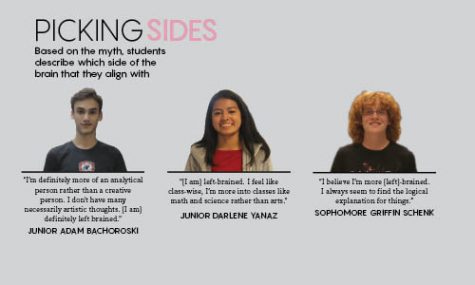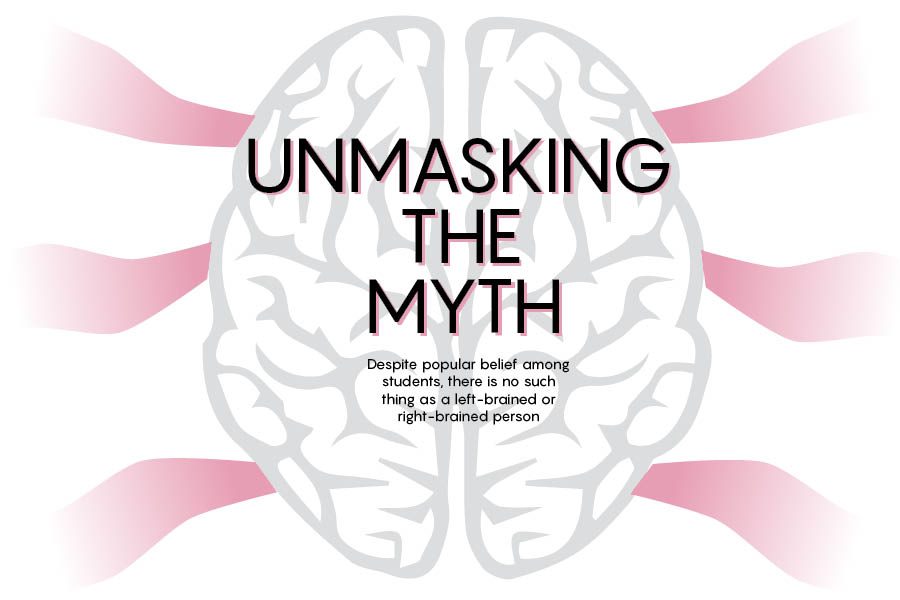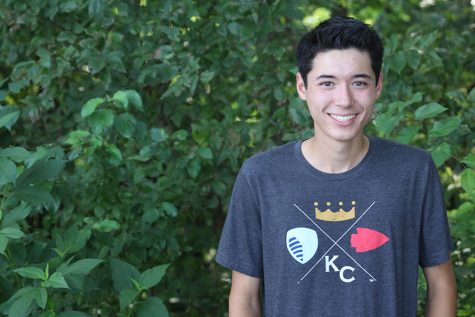Myth of brain hemisphere dominance contrasts popular belief
51 percent of students in psychology classes believe that personalities align with different sides of the brain
October 22, 2017
In comedian Bo Burnham’s popular song “Left Brain, Right Brain,” Burnham’s brain separates itself, with one side singing about evolutionary purpose and the other singing about Oreos and love. These lyrics explain a well-known thought process in pop psychology: the left brain is logical and intelligent, while the right brain is emotional and creative. It’s also a common trend for people to categorize themselves into left brain and right brain “people” based on where their strengths lie.
The problem is that brain dominance is a myth. It doesn’t exist.
According to Psychology teacher Kirsten Crandall, this idea started with a scientist named Roger Sperry. He conducted a series of experiments in the 1960s called the Split Brain experiments, which later led to a Nobel Prize in 1981. As stated by the organization for the Nobel Prize, these experiments discovered that the two hemispheres of the brain learn tasks differently and carry out specialized functions.
Crandall believes the public adopted these ideas about hemisphere dominance and naturally began to make assumptions. This is how a mostly scientific and biological study ended up as one of the most popular ideas in pop psychology.
“If they thought that they were better at the things the left brain does, they took that to mean that you have a stronger side of your brain,” Crandall said. “And that’s just not true. It’s drawing a parallel to personality that just isn’t there.”
Despite being debunked by scientists, the idea of brain personalities remains a popular idea. The JagWire distributed a survey in Crandall’s psychology classes asking students if they believe in the phenomenon.
Out of 68 students, 51 percent said they believed in hemisphere dominance while 49 percent said they didn’t.
Senior AP Psychology student Graham Wilhauk said he believes in the phenomenon, and would classify himself as right brained.
“I’m very creative and I like artistic things and feeling things,” Wilhauk said. “I just don’t like to be analytical because it’s just too stern and emotionless.”
Upon learning this idea of brain personalities was a myth, Wilhauk said he was surprised.

“Wow, I’m shocked more than anything,” Wilhauk said. “I’m more confused. Now I have to figure out what makes me the way I am.”
Similarly, junior Jordyn Saunders originally aligned herself as right brained, but acknowledges that she can relate to both.
“That surprises me a little bit because I honestly thought I was right side, but hey, I might be on the left too,” Saunders said. “I’m very intellectual as well. I mean, I’m in AP Psych, so clearly I’m analytical as I get out.”
Although she acknowledges that thinking about brain personalities may be interesting, Crandall wishes students would dive deeper into the scientific aspects.
“I wish that [students] would take these pop fiction things and explore the science behind it,” Crandall said. “The brain is really interesting and it’s kind of unfortunate that the research got so miscommunicated.”












StephanieRMontgomery • Nov 7, 2017 at 5:35 am
Thank you for providing such a wonderful list of a new website as I hardly needed them.Thank you so much once again. Keep it up.